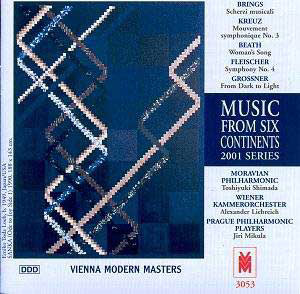This disc is in many ways more successful than others
in the series. By only including five (well contrasted) composers VMM
allow at least two of them a chance to ‘spread themselves’ including
a work the composer called ‘Symphony’. At well over 20 minutes it is
the longest piece on the disc.
The booklet has photographs of each composer and they
are also allowed to write about their own music. I never think that
this is a good idea and I speak as one who has had to do it himself.
Moral: always try to get someone to write about you. (I would also add
try to get someone else to perform or conduct your music). When Maximilian
Kreuz writes in the third person "the composer has concerned
himself with a new kind of chromatic tonality, which in this piece determines
the harmonic language" I wonder why he didn’t write it in the first
person. Is it because he goes on to tell us "creation of this work
was supported by the City of Vienna", an attempt to place himself
outside the intimate and into the public arena. Despite his rambling
description this is the most successful piece on the CD. Possibly it
falls under the shadow of his fellow Austrian, the late Gottfried von
Einem (b.1918) but it is none the worse for that. Its six movements
evolve logically and with intensity.
The rest of the disc, I cannot get too excited about.
Allen Brings’ title might remind you of Monteverdi’s
delightful ‘Scherzi musicale’. Well this boisterous piece is
in the tradition of an orchestral scherzo; certainly a difficult form.
The mood of this piece is too serious and heavy-handed. Brings has a
very impressive CV as composer, author, academic and performer but this
work does not make me particularly want to search him out again.
Sonja Grossner has just completed a Ph.D. in
composition at Birmingham University after working in other musical
areas. I was at first put off by the title - so many pieces explore
the theme of a journey from darkness to light. The opening, with timpani,
bells, a harp glissando and swirling string lines, is certainly effective.
Where it falls short is its failure to convey a sense of darkness. In
its place we gain a sense of uncoordinated striving. There is some impressive
writing for the orchestra, especially in the faster second section,
but the music lacks focus and direction.
Placing Betty Beath’s very brief ‘Woman’s
Song’ in the middle of the CD makes even less sense when you realize
that it "was conceived as a companion piece to my Lament for
Kosovo", recorded on VMM 3052. It would surely have been preferable,
especially as this CD has enough space left on it, to have put the two
together. It is a tuneful and wistful little piece, but too short, at
two and a half minutes, to stand-alone.
As for Tsippi Fleischer’s (born in Haifa) Fourth
Symphony, it is deliberately in an oriental style. It incorporates,
alongside a full size orchestra, some Jewish instruments. These play
a major part throughout. This is not a new idea but it is certainly
a difficult one to bring off. The opening melody winds it way around
the strings punctuated by the wind-blown sounds of the folk instruments
including the Indian ‘bansuri’ and the Nigerian ‘udu’. The structure
could be described as a fantasy in no conventional form. I suppose then
I shouldn’t have been surprised by the last minute of the work when,
for the only time, there is a new texture: a strong unison passage for
the folk instruments, strings and percussion. This accelerates and suddenly
ends just when a climax point seemed to be coming. One needs a different
pair of ears for music like this. The nearest I had come to this before
was ‘Hallel’ by another Israeli composer Ben Zion (Music in Israel
M11 CD 14) - well worth investigating. On repeated hearings Fleischer’s
Symphony proved increasingly interesting and the twenty-three minutes
of its duration did not drag.
So, once again a mixture of styles and compositional
originality and expertise. The whole series on Vienna Modern Masters
continues to be very enterprising and I hope that it develops, but perhaps
with a little more care in the choice of repertoire.
Gary Higginson


